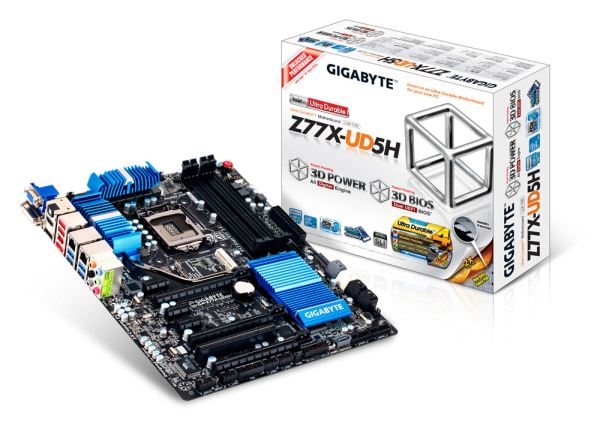Gigabyte GA-Z77X-UD5H Review: Functionality meets Competitive Pricing
by Ian Cutress on July 25, 2012 5:00 AM EST- Posted in
- Motherboards
- Gigabyte
- Z77
On paper, the Z77X-UD5H sounds like a great board with a ton of features. It is hard not to notice the dual network ports (one Intel), the mSATA, the extra SATA ports, a total of 10 USB 3.0 ports available (if you have enough USB 3.0 panels), a full compliment of PCIe 3.0 GPU lanes for tri-GPU, a Trusted Platform Module, Firewire/IEEE1394 and a full set of video outputs. All of this for $180 seems a bargain, especially considering the rest of the motherboards in this price bracket.
Gigabyte has also been improving its BIOS functionality, and is now giving us something that is quick to respond and a little easier to navigate. We have suggested several features that would be beneficial to non-technical users and enthusiasts alike, and we hope that Gigabyte take them on-board.
Unfortunately, the buck sort of stops there - talking about the software and performance from here on out does not bring gold medals. Starting with the software, I am sad to say that it is looking very outdated and needs a swift kick in the correct direction. It has not changed in any way since I first started reviewing for AnandTech 18 months ago. Some items do not need changing, like @BIOS, but EasyTune6 is still rough around the edges. It would be nice for Gigabyte to also consolidate all their software into a single clean interface for a user.
Performance on the Z77X-UD5H ends with mixed results - the motherboard benefits from MultiCore Enhancement, which gives the full turbo-mode of the CPU no matter the CPU loading. On the i7-3770K this means an extra couple of hundred MHz on standard - this helps the Z77X-UD5H reach the top (or near top) results in our CPU testing.
The UD5H comes more often than not in the middle in terms of peak and real-world IO performance, but drags behind when it comes to DPC Latency. In the gaming tests, the UD5H has some preferential tests but others are not so great, even though the board comes top in all the boards we have tested with three AMD GPUs due to the x8/x4/x4 PCIe 3.0 configuration.
The reality of it comes down to the fact that Gigabyte has encrusted this motherboard with many features for a low price. This is hard to ignore. Performance is always there or there about, and if you end up not too bothered about fans (or have your own controller), the Z77X-UD5H represents a good buy at a good price point. Users who want a WiFi controller can also invest an extra $30 to purchase the Z77X-UD5H-WB-WiFi version, at the expense of a PCIe x1 slot.
For offering so many features on a Z77 motherboard for $180, I would like to give the Gigabyte Z77X-UD5H an AnandTech Editors' Choice Bronze Award. It represents good value in a motherboard market that is blurring the lines between mid-range and high-end products.

AnandTech Editors' Choice Bronze Award
Gigabyte Z77X-UD5H











70 Comments
View All Comments
IanCutress - Tuesday, July 31, 2012 - link
Please note that even if you have purchased a '6Gbit/s' SSD, it will never run at that speed. If you look at our SATA and USB testing, none of the peak speeds we see in our benchmarking ever reach the peak advertised by the port due to the limitations of the hardware. They more often than not do not even reach the peaks of the hardware due to latency or real-world situations. Most rated speeds are for compressible continuous data with a high queue-depth - not ever a realistic scenario.Testing every 3rd party controller adds testing time. Going from 2-3 boards a month do maybe one and a bit. Especially if they're all connected differently on the board (which we don't always know without specific chipset diagrams for the specific product, which are not always available). After all, peak tests are limited in their understanding anyway - take the new USB boost technologies from ASUS and ASRock. ASUS' implementation affects mainly short size block transfers by several order of magnitudes (as found out in our testing), rather than peak by any significant amount.
I am quite astounded by your insistence that if you have many ports that they must all run at their peak speed in conjunction with each other at the same time. It just doesn't work that way. Have a gander at the chipset diagrams in our first Z77 reviews to understand this. Bandwidth is delivered to what needs it at the right time - the usage model for hammering all the ports at once is almost non-existent.
Ideally we'd love to test everything at the peak, but we do not have an unlimited amount of cash to go and buy equipment. We're independent freelance reviewers making do with what kit we can get together or are offered.
iCrunch - Sunday, July 29, 2012 - link
I've become so spoiled by how incredibly seamlessly, fast, and consistent Thunderbolt works. Add to that the fact that I can probably get most of the specs in an external Thunderbolt enclosure/dock solution fairly soon...albeit for a tad more money.Scootiep7 - Sunday, July 29, 2012 - link
Wow, so Gigabyte finally took my complaints to heart and started releasing boards with something other than that ALC887 miserable excuse for an audio codec. Bravo good sirs, better late than never. Now get it done on more of your boards!Questor - Tuesday, July 31, 2012 - link
I have this motherboard with an Ivy Bridge i5 3570K, currently at a stock speed, with a Plextor 128 GB SATA III SSD as the OS drive. Even with the post logo screen enabled, I get to desktop log-in in about 7 seconds. Excluding the "artificially" added time to type my password, full desktop is an average of 2.5 seconds from there. Not bad considering the programs I have that load versus Anantech testing.I have had my board since its early retail release and this has not changed much; even after replacing the original i5 2500K and Samsung SATA II 128 GB SSD for the above mentioned components.
Questor - Tuesday, July 31, 2012 - link
In addition to the boot time being misleading commentary and the response to the USB vs PS/2 keyboard, my present computer build with this Gigabyte board is one of the best/favorite rigs in my 14 years of building and tweaking computers.The other few are ASUS P8P67-PRO, Gigabyte MA790GP-UD4H (X2 with two cores unlocked to quad and STILL running stable), EPoX EP-9NPA+ Ultra, ASUS P5A with AMD K6-350 (severe electrical spike took it out after years of OCing - jumped the surge protector)!
Questor - Tuesday, July 31, 2012 - link
In addition to the boot time being misleading commentary and the response to the USB vs PS/2 keyboard, my present computer build with this Gigabyte board is one of the best/favorite rigs in my 14 years of building and tweaking computers. The other few are ASUS P8P67-PRO, Gigabyte MA790GP-UD4H (X2 with two cores unlocked to quad and STILL running stable), EPoX EP-9NPA+ Ultra, ASUS P5A with AMD K6-350 (severe electrical spike took it out after years of OCing - jumped the surge protector)!minlian - Sunday, August 12, 2012 - link
Is the reaction time DPC Latency error fixed on the Gigabyte Z77X-UD5H-WB-WiFi version or are they just the same motherboard with just a wifi difference?Triniman - Sunday, August 12, 2012 - link
Ian Cutress wrote, "...a total of 10 USB 3.0 ports available (if you have enough USB 3.0 panels)."Does anyone know of any cases that will would allow you to use the 3 onboard USB 3.0 headers?
Also, is it correct that the Gigabyte doesn't include drivers for these VIA controllers?
ETruett - Tuesday, September 11, 2012 - link
Hay. I am wondering if the Gigabyte GA-Z77X-UD5H Motherboard will fit in the Dell E510 Case? Or which Case can i get? I would like to build a nice gaming pc that whill not break me. I dont have much money. My eMail is: etruett9@gmail.com..... :-))gkatsanos - Monday, November 26, 2012 - link
Hi, It's weird how in any of the reviews there was a word for the problems (bugs) this M/B has. I ordered it a week ago and even if I upgraded my BIOS to the latest version, it still suffers from problems.. I had for example to disable the Marvell sata controller and connect my drive to the intel chipset one for the system to shutdown properly... Other folks have had freezes etc. Google the model + problems and you'll see. I am thinking of changing it with an Intel m/b or something more stable..